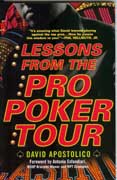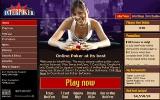
Lessons from the Pro Poker Tour
The Best Laid Plans
My new book Lessons from the Pro Poker Tour is out this month. This book examines hands that I both played and observed on the first season of the Professional Poker Tour. The hands represented David Apostolico is the author of 'Machiavellian Poker Strategy', and 'Tournament Poker and The Art of War,' and his latest title 'Poker Strategies for a Winning Edge in Business.' David's website is www.holdemradio.com/blog/ are those that are played in the trenches where poker tournaments are won and lost but aren’t necessarily sexy enough for television. I thought it would be fun in this column to share the following excerpt from that book:
David Apostolico is the author of 'Machiavellian Poker Strategy', and 'Tournament Poker and The Art of War,' and his latest title 'Poker Strategies for a Winning Edge in Business.' David's website is www.holdemradio.com/blog/ are those that are played in the trenches where poker tournaments are won and lost but aren’t necessarily sexy enough for television. I thought it would be fun in this column to share the following excerpt from that book:
I often hear poker compared to a chess match. Certainly, there are similarities. Just as in chess, you have to think ahead and anticipate your opponents’ moves. In both games, the ability to set traps for your opponent is critical to your success. There are a couple of big critical differences, however, that makes poker more difficult. First, in poker, you always have the risk of the unexpected. Every new card has the potential to radically alter the landscape. Next, poker is a game of incomplete information. In chess, all the pieces are on the board for both players to see. In poker, you do not know your opponents cards. Finally in poker you must make quick decisions. Sure, you can take a few minutes if need be. However, in poker your contemplation can often be revealing. In chess, your move is your tell. Your contemplation is not nearly as revealing.
Let me offer an example of what I am talking about from a hand I played at the PPT event at The Bellagio in Las Vegas. My initial table broke up after we were into the 4th level. With blinds now at $100-$200 and $25 antes and playing nine handed, there was $725 starting in every pot. This was certainly enough to make situation stealing worthwhile. The first hand I played at this table, I raised to $600 from middle position with A-10 suited. Everyone folded to Humberto Brenes in the big blind who called. The flop came K-9-5. Humberto checked, I bet another $600 and Humberto called. I was not sure what to make of this, so when the turn brought a blank, Humberto checked and so did I. The river brought another blank, Humberto bet and I folded. Now, I do not know if Humberto was playing an ace here or if he had part of the flop or if he was just trying to outplay me. Since this was my first hand at the table, I did not want to push it too far. I had no feel for the dynamic of the table or how each individual was playing. I do not at all second guess how I played this hand.
After this hand, I did not get much to play for a while. I noticed that Humberto was playing very conservatively. In fact, the only time he played was when I was in the big blind. Everyone folded to Humberto who raised from middle position and then everyone folded to me in the big blind. Since I had nothing, tossing my hand was an easy decision. However, I did get the sense that Humberto sensed weakness on my part and was attacking me.
The next time the big blind came around to me, I caught Humberto looking in my direction before he even looked at his cards. I just new he was going to raise if everyone folded to him. Sure enough, everyone folded to him and he raised to $600. Now, if everyone folded to me, I was going to raise no matter what I had. Just as I hoped, everyone folded to me. I had not yet looked at my cards. I waited until all eyes were on me as I wanted to make a good show of it. I wanted to sell my hand whatever it was. Well, I peek at my cards and, to my surprise, I see a pair of Kings. Up until this point, the best pair I had been dealt all day was a pair of sixes. Needless to say, my hand did not need much selling. I immediately called out “I’m going to raise” just as I had planned on doing.
As soon as the words came out of my mouth, I wanted to take them back. You get very few chances in a tournament to trap an opponent and accumulate some chips. When those opportunities come up, you have to maximize your chances. Here was a perfect opportunity. I am already head’s up so I do not need to re-raise in order to isolate one opponent. Since I am in the big blind, the range of hands I could be playing is tremendous. Plus, I know Humberto wants to attack me. If I smooth call and then check the flop, I am sure to get some action. Sure, I run the risk that Humberto will outdraw me. However, if you always think like that you will never accumulate chips. Plus, I really did not think Humberto was that strong here. While I was in no risk of being blinded out at this point, I still had the third shortest stack at the table. I could really use chips and this was about as an ideal of a situation as you can hope to get in order to accumulate chips.
Well, now that I had already said raise, I had another decision to make. Specifically, how much to raise? I thought about raising the minimum which would be another $600. Then it occurred to me to try and oversell my hand. If I raise big, I may make it worthwhile for Humberto to re-raise or even move in on me. So I raised $1500. Sure enough, Humberto folded. My original plan worked perfectly. Too bad I was not holding 7-2 off suit. Then I would have felt really good about this play. As it was, I knew I had just missed a golden opportunity to win some chips. These are the hands that you look back on after you are eliminated. Mistakes you make in not accumulating chips are just as big as the mistakes you make in squandering chips.
Lesson Learned
Poker is a game of never ending adjustments. You must constantly be aware of, among other things, how others are playing and how others perceive you. Here, I thought I was being proactive in picking up how I thought Humberto was playing me and I was prepared to use that to my advantage. The adjustments never end in poker, though. You should never make a final decision on your action until you have all the available information. Here, I made a premature decision that if Humberto raised and everyone else folded, then I was going to re-raise. That is exactly what happened. The one critical piece of information which should have affected my decision was, of course, my cards. With a monster hand, this was a golden opportunity to just smooth call. Poker is all about making the correct decisions. Never make a final decision until you have all of the available information. Unless I am in early position, I never look at my cards until it is my turn to act. I do not want to be influence my decision until I have seen what everyone else has done.
In this particular case, I was caught playing chess rather than poker. I thought I picked something up on Humberto and I was going to out maneuver him. This was a chess match that I was going to win. Unfortunately for me, I forgot I was playing poker. The cards I held could dramatically change my position and reasoning.

